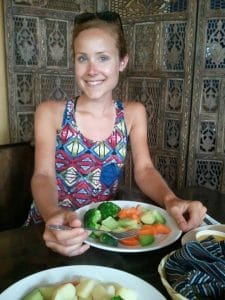Hi, I’m Kelsey. Thanks for your interest in Vegan Paleo.

A long-term vegan (8 years and counting), I am “this way” because I don’t want to eat animals. That said, I’ve always had an interest in the “dietary vegan” or “vegan for health reasons” aspect. For quite some time it was all fun and games (pure curiosity) until I discovered I’m gluten intolerant. After said discovery I adopted a raw food diet, omitting all cooked foods (including steamed vegetables, my all-time favorite dish). The result of my raw food adventure is as follows: I indulged in one too many avocados, adding 20+ pounds to my previously lean frame. Meanwhile I was almost always cold, trying to survive Oregon winters whilst refusing to eat anything heated above 115° F. Finally, it occurred to me that people living in the Pacific Northwest are not meant to thrive on avocados from Mexico or bananas from Ecuador and Honduras. And now 4 years later, with a degree in anthropology and 13 months of life in Latin America to speak of, my views have changed to some extent. Despite my total commitment to veganism, I’ve recently delved into the theories and ideas behind the paleo diet. Further, I’ve wondered why so many people are of the opinion that vegans can’t be paleo, or that paleo and vegan are mutually exclusive. As a dedicated student of anthropology I’m interested in the ways in which our human ancestors survived nutritionally, and how their diets changed as they developed certain skills and ideas. So…long story short, this curiosity led me to the paleo diet.
According to many, a vegan cannot eat according to paleo principles. I beg to differ. A raw vegan diet, for example (which I strayed from 3 years ago) is entirely paleo minus the animal flesh. While vegans (especially raw vegans) do tend to eat mejool dates and other sweets not considered optimal by paleo standards, I think it’s safe to say that times have changed since the original homo sapiens walked the earth–thus, we should view things in perspective (according to present-day, culturally-relevant contexts). Granted, some raw vegans eat soaked/sprouted grains that paleo dieters typically avoid–yet many raw-foodists eliminate grain entirely. This is to be expected. Just like any diet, there are deviations from the mean. Yet many paleo advocates argue against a vegan diet–on the premise that vegans cannot be paleo because our hunter-gatherer ancestors supposedly thrived on meat.
This is where things get a little complicated.
See, the first humans hunted and gathered throughout their lifespan–if they didn’t work for it, they wouldn’t eat. As a result, they would die. For this reason, hunter gatherers were not concerned with being kind to animals or wearing ethically-produced fibers. In other words, they ate animal carcasses and wore animal skins (when they succeeded in obtaining such luxuries). For the most part, our human ancestors foraged for food (often berries and wild greens and sometimes fish or small warm-blooded creatures, but rarely large mammals). What’s ironic about the paleo diet is the implication that beef, pork, and organ meat consumption (on a regular basis, whenever is convenient) emulates the eating patterns of prehistoric humans. In this day and age, eating like a caveman (in the true sense of the word) is not possible. Despite claims made by promotors of the paleo diet, the modern societies we live in prevent us from living as early humans did.
Let’s talk about the Industrial Revolution, shall we?
The paleo diet was built upon ideas about certain cultural events. Namely, the Industrial Revolution. A central point argued by paleo dieters is that all grains should be avoided because prior to modern machinery, grain wasn’t available and thus could not be a reliable source of nutrients. Thus, humans needed to utilize other resources (that which they had access to, as hunter-gatherers). The question is: what did they have access to, and how did they go about obtaining it? Please state your answer (leave a comment below)! I’d love to hear ideas, opinions and stories.
To verify my identity as a real person and/or to see photos of my travels/anthropological research/teaching experiences/permaculture farm volunteerism in Latin America, please add Kelsey Jean on facebook and “Like” my page if you are interested in this new frontier of vegan/sustainable eating.
Follow me on Instagram @Vivaluminosa, where I sometimes post about food and other things related to paleoveganism.
Cheers,
Kelsey
